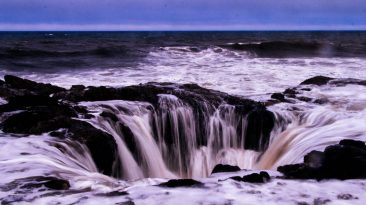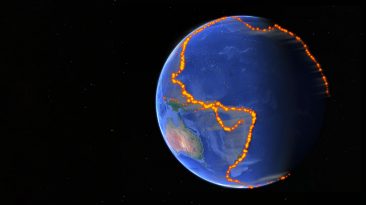It’s about to get really hot down on Earth. Because all our oceans suddenly started to boil, sending steam into the atmosphere at an alarming rate. Why would all this water in the air lead to setting the planet on fire? How would you feel with all this extra humidity? And how could this make Earth a lot like one of our sister planets?
Earth’s water goes through an amazing cycle. Rain runs off into rivers, which carry that water to oceans, where eventually it evaporates back up into the clouds. Over and over, without fail. The water vapor in our atmosphere is one of the reasons our planet is habitable. It accounts for about half of the atmosphere’s greenhouse warming effect. And there are nearly 38 million billion gallons up there.
If it all condensed and fell back down to Earth at once, you’d see 30 mm (1.2 in) of rain all around the planet. But soon there could be a lot more vapor, as we’re about to turn up the heat to a steady boil. As our oceans started heating up, the air would definitely feel sticky, hot and heavy. And with such high humidity, your body would struggle to cool down as the warm moisture would stay on your skin for longer.
You could start to suffer from heat exhaustion. But this wouldn’t be the only trouble. We’d now be caught in the middle of a vicious cycle. As this heat spreads further through the oceans and atmosphere, the atmosphere would be getting overloaded with water vapor. And this wouldmake things even hotter.
The planet would now be absorbing more energy from the Sun than it can radiate back into space. So we’d be on the verge of a runaway greenhouse effect. And things would just get hotter. The temperature all over Earth would start to even out, and the poles would become warmer.
The polar ice caps and mountain glaciers would melt. And that would rise sea levels about 70 m (230 ft). Flooding would destroy coastal cities around the world, displacing hundreds of millions of people. And all this added seawater would be adding fuel to the fire of our increasingly warm, evaporating oceans. At this point, all life on Earth would start to vanish.
It would still take several hundred, or even thousands of years before the oceans are truly boiling away. Because of evaporation, the boiling point would increase. That’s because of the higher salt concentration of the remaining ocean water. With no stop to the increasing temperatures, all of this water would disappear.
Our planet would turn into a barren landscape with new canyons like the Mariana Trench extending down 322 km (200 mi) below what used to be sea level. Our atmosphere would be steamy, to say the least. It could be hot enough for wood to spontaneously combust. Luckily, you wouldn’t be around anymore to deal with the forest fires all over the planet.
Eventually, temperatures could reach or even surpass the sweltering 482 °C (900 °F) heat of one of our neighboring planets, Venus. Astronomers suggest that Venus could have experienced a similar runaway greenhouse effect and had all of its oceans boil away. But it wouldn’t stop there.
As temperatures continued to climb, there would be nothing left of our bodies except ash. The atmosphere would now be as hot as 1,400 °C (2,552 °F). And at this point, there would be nothing stopping the oceans from boiling away. Even skyscrapers made of stainless steel and glass would melt into nothing more than a puddle on the ground.
Sources
- “Water Cycle”. 2022. noaa.gov.
- “How Much Water Is In Earth’s Atmosphere?”. Joe Phelan. 2022. livescience.com.
- “Steamy Relationships: How Atmospheric Water Vapor Amplifies Earth’s Greenhouse Effect – Climate Change: Vital Signs Of The Planet”. Alan Ruis. 2022. climate.nasa.gov.
- “Climate Change Indicators: Oceans | US EPA”. 2016. epa.gov.
- “Explained: Greenhouse Gases”. David L. Chandler. 2017. news.mit.edu.



























